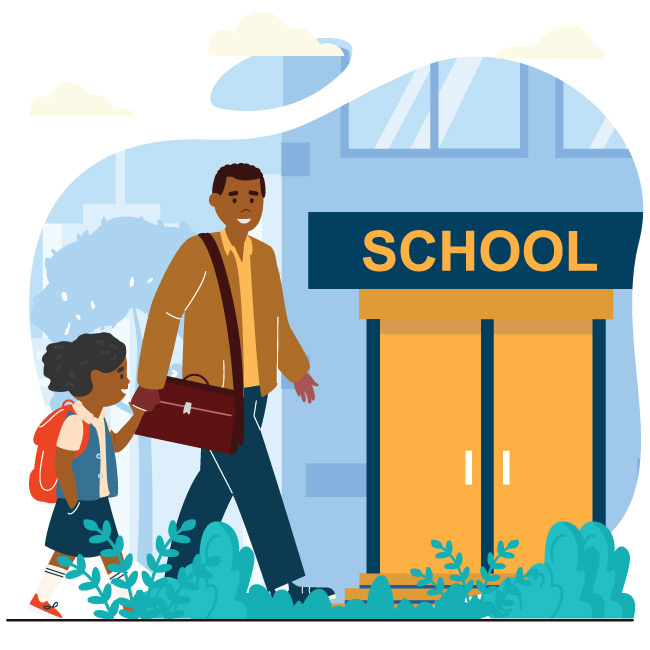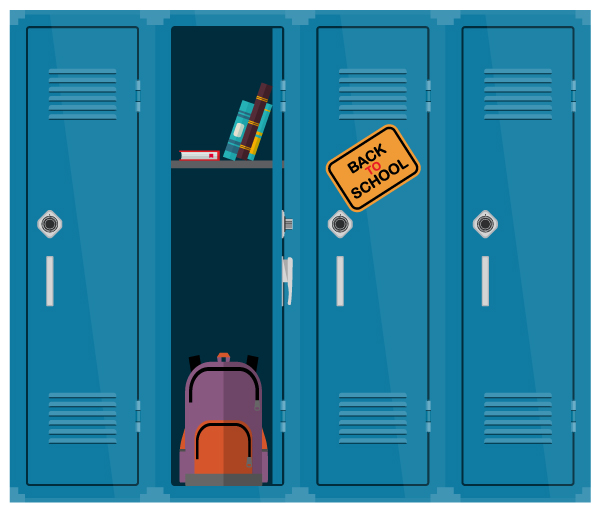Essential Strategies for Going Back-to-School

Backpacks and school supplies have started to line the entryways and aisles at all of the major stores and back-to-school advertising is everywhere… Preparations for the new school year are in full swing.
There is a lot of anticipation associated with going back to school and the transition out of summer can be exciting and overwhelming for students and caregivers alike. Thankfully, there are MANY ways to make the transition from summer into the new school year as exciting and as minimally stressful as possible. We’ll share some strategies for students of all ages that are headed back to school.
Gradually Bring Back Structure
Many caregivers dread the summer months because they lose the daily structure, routines, and support that school provides. The routines of school take a lot of the guesswork and stress out of a caregiver’s day. However, once those routines fade and summer’s casual days have set in, it can be incredibly hard to transition back into a routine as it was to fall out of one. The key is to make sure you plan for it, here’s how.
- If they wake up later during the summer then start waking your child up at an earlier time. This doesn’t mean they need to get up quite as early as they would for school, but it’s a good idea to get as close to that time as possible for several days in a row prior to school’s start to get your child used to it.
- After they wake up, do the entire morning routine as you would if they were going to school. For example, getting up, getting showered, having breakfast, etc. We all know mornings can be stressful, so getting into the habit of waking and performing the morning routines in advance can be a very helpful way to prepare.

- Don’t leave everything for the morning. Plan clothing and pack lunches at night. If you can fit it in, have your child bathe or shower at night, too. In fact, leave as little as you can for the morning so that your child can get out the door as efficiently as possible, and so you have as little to fight about as possible, too.
- As much as you can, have your child involved. Allow them to take part in the process of picking their clothes out and packing their lunches. Giving them that responsibility can build independence and also build behavioral momentum because they may be excited to wear what they’ve chosen or excited to eat what they’ve packed. This will also allow them to express themselves and have some agency in their choices, and build confidence at the same time.
Learn About New Teachers & New Schools in Advance
It can be incredibly helpful for your child to let them see a picture of their new teacher if possible, but at a minimum, practice their name.
Try to familiarize your child with their new teacher in advance as much as you can to help lessen their anxiety about meeting them. There is no need to go overboard, but asking their new teacher for a photo, or a little bio or fun fact can really eliminate some of that anxiety and can prepare your child for that first meeting. These days, most teachers send something like this out in advance anyway, but it never hurts to ask a couple of weeks before the school year begins.

If you have recently moved, or your child is starting a new school for the first time, it can be VERY helpful to take your child to their new school ahead of time so they can look around outside, and inside if you can arrange it. Again, this will help eliminate much of the stress that comes with the unknown.
Make a test run to the new school by taking the route that your child will take to get to school. This applies to any method of transportation. You can drive there, walk there, bike there, etc. to get an idea of the route. Of course, there will be things you cannot plan for that you will encounter on school days that may not impede on your test run, but the idea is to eliminate as much of the unknown as possible and to create the most efficient and successful plans for school day mornings.

Be sure to spend some time on the school’s website. There is always tons of useful information about the school, teachers, clubs, and teams. Plus, there’s usually a map as well. Again, it’s all about alleviating anxiety from the unknown.
Post an Old-fashioned Calendar For All to See
Post a calendar in a high-traffic area of your home with events for the day, week, and month.
If your child cannot read, include symbols or pictures that they would be able to understand.
Review the calendar at the beginning of the month, week, and day so that everyone knows the agenda. If your child perseverates on certain activities that they truly do not like, this can be a helpful strategy, or possibly a hurtful one, so be mindful.
- You know your child. If seeing the dentist on the calendar at the end of the month helps them understand that it is coming and allows you to productively talk about it together and get ready for the appointment, then it is a good idea to leave it there.
- On the other hand, if seeing the dentist on the calendar for a couple of weeks is correlated with increased perseveration in your child, consider putting that one up the day before so that they are prepared, but not thinking about it all month long causing them more stress than needed.
Leaving Elementary School?
If your child is leaving elementary school, be sure to start preparing early. There are a lot of changes they will encounter that are more easily managed with a little bit of prep time and practice.
- If your child will have a locker, practice opening locks with them so they know how to open their locker when once they get to school.

- If they will be buying their lunch with a card, or with cash, teach them how to do that at a convenience store
- If they will be changing in a locker room, teach them about what to expect and how to dress/undress privately. If they struggle to do so quickly, practice dressing/undressing quickly so they don’t feel as rushed when the gym teacher wants them to do so quickly.

Remember, you can’t prepare for everything but you truly can prepare for a lot with a little bit of thoughtfulness and patience.
The Take-home Message
When it comes to getting ready for the new school year, the main strategy is primarily the same regardless of your child’s age or ability level. Prepare for what you can in advance, before the year starts, and before each day and week. Your child will thank you for it, maybe not out loud, but definitely on the inside. One thing is for certain though, you will thank yourself for it!
